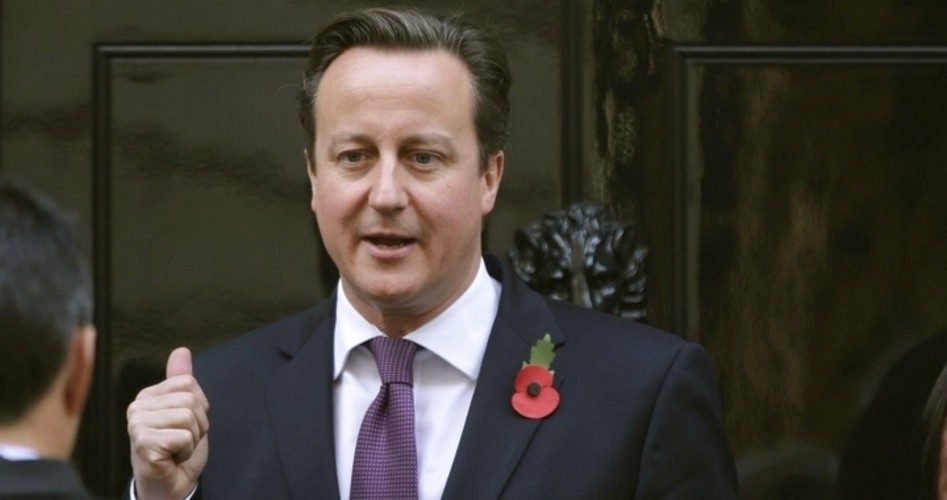
The House of Commons voted 307 to 294 on October 31 in a symbolic, nonbinding resolution for the government to take a tougher stand in the European Union budget process. The vote was the first significant defeat for the government since taking office after the 2010 general election. The defeat is not considered to be a vote of no confidence in the government, which would have triggered new elections, but it was a humiliating defeat for Prime Minister David Cameron and his coalition government with Deputy Prime Minister Nick Clegg and his Liberal Party.
Clegg, whose Liberal Party votes are needed to form a majority in the House of Commons, has historically been a supporter of the European Union. The political problem for Cameron is that the votes which he lost came from members of his own Conservative Party. Cameron cannot lose the support of either the Liberal Party coalition partner or members of his own Conservative Party and continue to form a credible government.
Polls suggest that the U.K. Independence Party, which is even more strongly opposed to the European Union, may win about 10 percent of the vote in the next election, which could easily deprive the Conservative Party of enough votes in Parliament to form a government after the May 2015 elections, even if the Liberal Party joined with them. Cameron’s government is currently running behind the Labor Party in test run polling for the next election.
That helps explain why the Labor Party joined with the opponents of the government in the October 31 vote, even though the Labor Party has supported the European Union. Ed Balls, the Labor Party spokesman for Finance said: “This is a humiliating defeat for David Cameron which shows how weak and out of touch he has become.” Cameron denounced Labor Party support against the government as “rank opportunism.”
The leadership of the Conservative Party does not question the need to look at the European Union budget more strictly. Chancellor of the Exchequer George Osborne, responsible for budgetary issues, said that Britain would veto any EU budget which was bad for British taxpayers, noting: “People are outraged when they see money being wasted in Europe. Britain has become more Eurosceptic over my lifetime.” Osborne also tried to convince members of his party that the Prime Minister sympathizes with them: “No one should doubt David Cameron’s determination, my determination to deliver a deal that is good for the taxpayer and that puts an end to outrageous increases in European spending.”
Prime Minister Cameron spoke much the same in the House of Commons before the October 31 vote: “This government is taking the toughest line in these budget negotiations of any government since we joined the European Union. At best we would like it cut, at worst frozen, and I’m quite prepared to use the veto if we don’t get a deal that’s good for Britain.”
But reassurances from leading members of the Conservative Party were not enough to persuade Conservative Party members to support the government in the vote. The sovereign debt crisis within the European Union by those nations which have adopted the single-currency euro has made British voters even more dubious of the benefits of the European Union to their nation.
Cameron has stated that his government will not support any European Union budget which provides for growth faster than the rate of inflation, but the trillion-dollar budget of the EU is already seen as extravagant by many British voters, and no one believes that the EU budget will provide for reductions in spending.
Cutting the budget, however, is just what Conservative Party backbenchers who supported the vote against the government are asking. Mark Pritchard, a leader of the parliamentary revolt, said: “This is a time for Brussels to listen to the British people and do what we are all doing, and that is cutting our cloth.”
The European Union leaders will meet in Brussels for a summit on November 22 and 23, but it is hard to see how the member nations can find anything that reflects real agreement.
France’s new Socialist Party President Hollande wants to “soak the rich,” which has led some of the nation’s most productive citizens to flee. Greece and Spain, both of which have one out of every four workers unemployed, are torn by marches and riots and, in the case of Greece, with accusations against Germany, the largest economy in the EU, of Nazism. Italy, whose former Prime Minister Berlusconi was just sentenced to prison, faces sovereign debt and economic recession problems only slightly less serious than Spain and Greece — and no nation could bail out Italy, the third largest economy in the eurozone.
Ironically, Brussels, the capital of the EU, is also the capital of Belgium. The artificial union of Walloon and Flemish has come under increasing attack by separatist parties within Belgium. That largely accounted for the 541-day gap between the June 13, 2010 general election in Belgium and the December 6, 2011 swearing in of the new government. How odd that, at the very time in which an increasing number of Belgians would support the breaking of Belgium into two smaller nations, the political leaders of nations in the European Union will be meeting in Belgium in an effort to keep the EU intact.
Photo: Britain’s Prime Minister David Cameron outside his official residence at 10 Downing Street in central London, Oct. 30, 2012: AP Images



